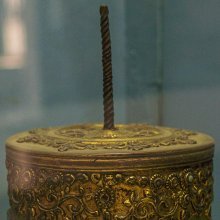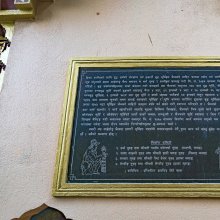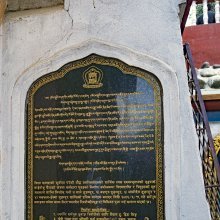Mane, Māne: 5 definitions
Introduction:
Mane means something in Jainism, Prakrit, Hindi, biology. If you want to know the exact meaning, history, etymology or English translation of this term then check out the descriptions on this page. Add your comment or reference to a book if you want to contribute to this summary article.
Images (photo gallery)
Biology (plants and animals)
Source: Google Books: CRC World Dictionary (Regional names)1) Mane in India is the name of a plant defined with Pandanus tectorius in various botanical sources. This page contains potential references in Ayurveda, modern medicine, and other folk traditions or local practices It has the synonym Pandanus tectorius var. sanderi (Sander) B.C. Stone (among others).
2) Mane in Zaire is also identified with Zanha golungensis It has the synonym Commiphora fraxinoides K. Schum. (etc.).
Example references for further research on medicinal uses or toxicity (see latin names for full list):
· Histoire des plantes de la Guiane Françoise (1775)
· Supplementum Plantarum (1781)
· Proceedings of the Indian Science Congress Association (1990)
· Annales des Sciences Naturelles; Botanique (1872)
· Bull. Mus. Natl. Hist. Nat. (1933)
· Journal of a voyage to the South Seas (1773)
If you are looking for specific details regarding Mane, for example extract dosage, chemical composition, pregnancy safety, side effects, diet and recipes, health benefits, have a look at these references.

This sections includes definitions from the five kingdoms of living things: Animals, Plants, Fungi, Protists and Monera. It will include both the official binomial nomenclature (scientific names usually in Latin) as well as regional spellings and variants.
Languages of India and abroad
Hindi dictionary
Source: DDSA: A practical Hindi-English dictionaryMāne (माने):—(nm) meaning, purport, import.
...
Prakrit-English dictionary
Source: DDSA: Paia-sadda-mahannavo; a comprehensive Prakrit Hindi dictionaryMaṇe (मणे) in the Prakrit language is related to the Sanskrit word: Manye.
Prakrit is an ancient language closely associated with both Pali and Sanskrit. Jain literature is often composed in this language or sub-dialects, such as the Agamas and their commentaries which are written in Ardhamagadhi and Maharashtri Prakrit. The earliest extant texts can be dated to as early as the 4th century BCE although core portions might be older.
Kannada-English dictionary
Source: Alar: Kannada-English corpusMaṇe (ಮಣೆ):—
1) [noun] a rectangular or square wooden plank with legs, for sitting on.
2) [noun] a square board with squares of two alternating colours used to play chess on or a rectangular plank having two rows of seven hollows to play usu. with tamarind seeds.
3) [noun] ಮಣೆಹಾಕು [manehaku] maṇe hāku to place a seat before another to sit on. 2. (fig.) to give undue preference, respect, to; to be favourably biased towards.
--- OR ---
Maṇe (ಮಣೆ):—[noun] = ಮಣಿಯ [maniya].
--- OR ---
Mane (ಮನೆ):—
1) [noun] a building where a person or family normally lives; a house.
2) [noun] a space enclosed by walls, within a house, separating it from other portions (as ಅಡುಗೆಮನೆ, ಊಟದ ಮನೆ, [adugemane, utada mane,] etc.).
3) [noun] the line of descendants of a particular ancestor; family; lineage.
4) [noun] parents and their children, considered as a group; lineage.
5) [noun] any of several, usu. square figure drawn, painted, etc. to play on (as in chess, dice-game, kuṇṭebille, caukābāra, etc.).
6) [noun] any of several keys of a musical instrument (as piano, harmonium, etc.).
7) [noun] any of musical notes in C-major, taken as a tonic note or base for singing or playing.
8) [noun] ಮನೆ ಪಾಲಾಗು [mane palagu] mane pālāgu (a house) to be disintegrated; the property (as house, land, cash, etc.) to be divided amongst children (or co-heirs); ಮನೆ ಮಾಡು [mane madu] mane māḍu to build a house; 2. to settle (oneself) at a place; 3. to take a house for rent; 4. (an impression, feeling, etc.) to make a long-lasting dent or impression on the mind; ಮನೆ ಮಾರು [mane maru] mane māru (pl.) a house and household things; ಮನೆ ಮುರಿ [mane muri] mane muri to ruin a family; ಮನೆ ಕುರುಕ್ಷೇತ್ರವಾಗು [mane kurukshetravagu] mane kurukśetravāgu (a house) to become a place for quarrel (amongst its family members); ಮನೆ ತೊಳೆ [mane tole] mane toḷe to destress very much or ruin a family; ಮನೆ ಚೊಕ್ಕಟ ಮಾಡು [mane cokkata madu] mane cokkaṭa māḍu = ಮನೆ ತೊಳೆ [mane tole]; ಮನೆಗೆ ಮಾರಿ ಊರಿಗೆ [manege mari urige] (ಪರರಿಗೆ [pararige]) ಉಪಕಾರಿ [upakari] manege māri, ūrige(pararige) upakāri (prov.) (said of a person who helps others, but not one’s own family) it is no good hen that cackles in your house and lays eggs in another’s; ಮನೆ ರಣರಂಗವಾಗು [mane ranaramgavagu] mane raṇa raṃgavāgu = ಮನೆ ಕುರುಕ್ಷೇತ್ರವಾಗು [mane kurukshetravagu]; ಮನೆ ಹಿಡಿ [mane hidi] mane hiḍi to stay within the house (without going out); 2. to take a house for rent; ಕೊಟ್ಟ ಮನೆ [kotta mane] koṭṭa mane (said of a woman) one’s husbands house; ಮನೆ ಕಟ್ಟಿನೋಡು, ಮದುವೆ ಮಾಡಿನೋಡು [mane kattinodu, maduve madinodu] mane kaṭṭi nōḍu, maduve māḍi nōḍu the difficulty of marrying one’s daughter or building a house, can be understood only by one’s own experience; ಮನೆ ಒಡೆ [mane ode] mane oḍe to disintegrate the members of a family; to ruin a family; ಮನೆಯಳಿಯ [maneyaliya] maneyaḷiya a man who permanently stays in his wife’s parents' house; ಮನೆಯಳಿಯತನ [maneyaliyatana] maneyaḷiyatana the fact of a man permanently staying in his wife’s parents' house; 2. a system prevalent in some parts, that the man to whom one’s daughter is given in marriage, stays in the family of his wife; ಮನೆಯಾಕೆ [maneyake] maneyāke the mistress of a house; 2. a woman as related to a man whom she has married to; ಸೇರಿದ ಮನೆ [serida mane] sērida mane ಕೊಟ್ಟ ಮನೆ ಮನೆಯವರು [kotta mane maneyavaru] maneyaru a man as related to his wife; a husband.
--- OR ---
Māne (ಮಾನೆ):—[noun] that which is to be copied or followed; a standard or model.
Kannada is a Dravidian language (as opposed to the Indo-European language family) mainly spoken in the southwestern region of India.
Nepali dictionary
Source: unoes: Nepali-English Dictionary1) Mane (मने):—n. (baby talk) kid (young of a goat);
2) Māne (माने):—n. 1. the sense; meaning (of a word or sentence) 2. Bot. elephant's ear; giant taro; 3. the monument over a Buddhist grave; 4. a prayer wheel; adj. pertaining a measure (ten handfuls);
Nepali is the primary language of the Nepalese people counting almost 20 million native speakers. The country of Nepal is situated in the Himalaya mountain range to the north of India.
See also (Relevant definitions)
Starts with (+101): Mane-damdo, Mane-gaum, Mane-madhauru, Maneas, Manebabu, Manebaduku, Manebagilu, Maneballi, Maneca Kalasa, Maneca Kanta, Maneca Khakhota, Maneca-kanta, Maneca-khakhota, Maneca-manaka, Maneccha, Manecchu, Maneci Panhali, Manedaiva, Manedala, Manedana.
Ends with (+238): Abhayamane, Abhragamane, Accamane, Accumane, Ademane, Adhogamane, Adigemane, Adimane, Adugemane, Adumane, Akramane, Alasagamane, Alemane, Aligulimane, Alimane, Alugunimane, Amanesamane, Ambaragamane, Amcegamane, Amgabhramane.
Full-text (+687): Simhakeshara, Agnishvatta, Pitritarpana, Ayala, Kesara, Ajyapa, Pitriyana, Vollaha, Pitriloka, Ushmapa, Paitrika, Nandimukha, Pitriyajna, Kavya, Anvaharya, Paitra, Urd, Samanodaka, Pitrivrata, Nivapa.
Relevant text
Search found 160 books and stories containing Mane, Maane, Māne, Maṇe, Maṇē; (plurals include: Manes, Maanes, Mānes, Maṇes, Maṇēs). You can also click to the full overview containing English textual excerpts. Below are direct links for the most relevant articles:
Chaitanya Bhagavata (by Bhumipati Dāsa)
Verse 1.10.56 < [Chapter 10 - Marriage with Śrī Lakṣmīpriyā]
Verse 2.13.14 < [Chapter 13 - The Deliverance of Jagāi and Mādhāi]
Verse 1.7.4 < [Chapter 7 - Śrī Viśvarūpa Takes Sannyāsa]
Animal Kingdom (Tiryak) in Epics (by Saranya P.S)
Garga Samhita (English) (by Danavir Goswami)
Verse 2.22.4 < [Chapter 22 - The Rāsa-dance Pastime]
Verse 2.5.37 < [Chapter 5 - The Liberation of Bakāsura]
Verse 5.2.10 < [Chapter 2 - The Killing of Keśī]
The Padma Purana (by N.A. Deshpande)
Chapter 9 - General Rules of Śrāddha Performance < [Section 1 - Sṛṣṭi-khaṇḍa (section on creation)]
Chapter 49 - Good Conduct < [Section 1 - Sṛṣṭi-khaṇḍa (section on creation)]
Chapter 50 - The Account of the Five < [Section 1 - Sṛṣṭi-khaṇḍa (section on creation)]
The Garuda Purana (by Manmatha Nath Dutt)
Chapter XCIX - Mode of performing Sraddhas < [Agastya Samhita]
Chapter LXXXIV - Ablutions in the river Phalgu merit of masing offerings of funeral cakes at Rudra < [Agastya Samhita]
Chapter LXXXIII - Description of different rites < [Agastya Samhita]
Harivamsha Purana (by Manmatha Nath Dutt)
Chapter 18 - An Account of Pitris < [Book 1 - Harivamsa Parva]
Chapter 16 - The Origin of Pitris and Fruits of Sraddhas < [Book 1 - Harivamsa Parva]
Chapter 21 - An Account of the Seven Brahmanas < [Book 1 - Harivamsa Parva]



